Integrating Your Social Media Calendar with Other Marketing Tools for Maximum Efficiency
December 3, 2024
In today’s digital marketing landscape, social media has become a cornerstone for building brand awareness, fostering engagement, and driving measurable results. With millions of users spending significant time on platforms like Instagram, Facebook, and LinkedIn, businesses cannot afford to overlook the power of social media as a key marketing tool. For companies looking to thrive, especially in a competitive market like Kochi, partnering with a digital marketing agency in Kochi can help harness this potential effectively. However, success on social media requires more than just sporadic posts; it demands a strategic approach with clear planning and timely execution.
A well-structured social media calendar serves as the backbone of this strategy. It helps digital marketers plan, schedule, and track content efficiently, ensuring alignment with broader business goals. However, the true value of a social media calendar is realized when it is integrated with other marketing tools like email marketing platforms, content management systems, and analytics software. For a digital marketing company in Kochi, such integration can be the key to creating a seamless, multi-channel experience that maximizes efficiency and boosts overall performance.
By integrating your social media calendar with other marketing tools, you streamline workflows, maintain consistent messaging across channels, and leverage data-driven insights to enhance engagement. This blog explores how integrating your social media calendar can amplify your marketing efforts, helping businesses achieve greater consistency, deeper audience connections, and better results — a must for any brand looking to stand out with the help of a digital marketing agency in Kochi.
Why a Social Media Calendar is Essential for Digital Marketing
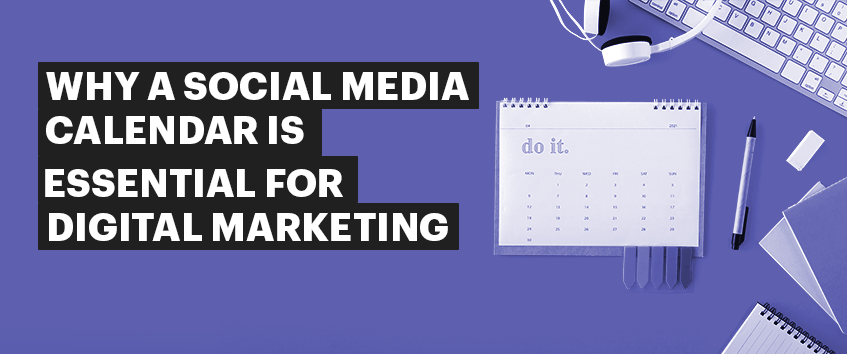
In the fast-paced world of digital marketing, consistency is key. With the constant flow of content across platforms, it’s easy for brands to lose momentum or become disorganised. This is where a social media calendar becomes invaluable, providing a clear framework for planning, scheduling, and executing content. For a digital marketing company in Kochi, a well-structured social media calendar is not just a tool but a strategic asset that helps in achieving marketing goals effectively.
Consistency and Planning
Maintaining a regular posting schedule is crucial for building brand recognition and trust. A social media calendar ensures that your content is not only consistent but also strategically aligned with your broader marketing objectives. It helps map out posts in advance, taking into account key dates, product launches, and marketing campaigns. This proactive planning avoids the last-minute scramble and allows for better resource allocation, ensuring that your messaging remains coherent and on-brand. For businesses partnering with a digital marketing company in Kochi, this level of organisation can be the difference between a successful campaign and one that gets lost in the noise.
Content Organization
A social media calendar acts as a visual roadmap for your content strategy. It provides a comprehensive view of upcoming posts, including the types of content (e.g., blog posts, videos, infographics), themes, and seasonal campaigns. This organised approach helps marketers ensure a balanced mix of content, catering to different audience segments and maintaining engagement. Additionally, it becomes easier to spot gaps in your content plan and make adjustments accordingly. For a digital marketing company in Kochi, using a calendar also means being better prepared for local events and cultural moments, allowing for more targeted and relevant content.
Team Collaboration
One of the biggest advantages of a social media calendar is its ability to enhance collaboration across different teams. Marketing, design, and content creation teams can work together more effectively when they have a clear overview of what needs to be published and when. A shared calendar minimises confusion, reduces overlapping efforts, and streamlines the approval process, ensuring a smooth workflow. This kind of coordination is especially important for a digital marketing company in Kochi, where multiple clients and projects are handled simultaneously. By centralising the content plan, everyone involved can stay on the same page, leading to more cohesive and impactful campaigns.
A well-planned social media calendar is more than just a schedule; it’s a strategic tool that ensures consistency, fosters creativity, and enhances team efficiency. When used effectively, it can be a game-changer for your overall digital marketing efforts.
The Role of Integration in a Unified Marketing Strategy

In today’s digital landscape, treating each marketing channel as an isolated entity often leads to inconsistent messaging and missed opportunities. Consumers now interact with brands across various touchpoints, including social media, email, and websites. To effectively engage your audience and create a cohesive experience, integrating your social media calendar with other marketing tools is essential. This result oriented integration helps form a unified marketing approach, ensuring consistent messaging, improved targeting, and better overall campaign performance.
Creating a Seamless Experience
Integrating your social media calendar with tools like email marketing platforms, customer relationship management (CRM) systems, and analytics software enables your marketing channels to work in harmony. When these tools are synchronised, you can create a seamless experience for your audience. For instance, aligning your social media content with email newsletters and blog posts reinforces a central message, providing a consistent brand experience regardless of where customers engage with your business.
This seamless integration is key to building customer trust and loyalty. Coherent messaging across platforms helps your brand appear more reliable and cohesive. Additionally, this approach streamlines workflows, allowing your team to execute campaigns efficiently and respond swiftly to market changes or emerging trends.
Enhanced Messaging
A significant advantage of integrating your social media calendar with other marketing tools is the ability to deliver unified messaging. By syncing your content plan with email campaigns, blog schedules, and advertising initiatives, you ensure that every piece of content supports a central theme or objective. This approach avoids confusion and strengthens your brand’s voice, making it more memorable to your audience.
For example, during a product launch, aligning social media posts, email newsletters, and website content creates a consistent and compelling narrative that highlights the product’s value. Instead of fragmented messaging, your audience receives a cohesive story that resonates across all channels, boosting engagement and reinforcing brand identity.
Audience Targeting
Understanding your audience and delivering personalised content are critical components of effective marketing. Data integration allows you to combine insights from social media analytics, CRM systems, and email marketing platforms, giving you a comprehensive view of your audience’s preferences and behaviours. This deeper understanding helps you tailor your content and messaging to specific segments, enhancing relevance and engagement.
For instance, if data analysis shows that a particular audience segment prefers video content, you can adjust your social media calendar to include more video posts. Insights from email campaigns can also highlight popular topics or common pain points, guiding the creation of social media content that addresses these areas. This targeted approach not only improves the customer experience but also builds stronger relationships and increases the likelihood of conversions.
Key Areas to Integrate With Your Social Media Calendar
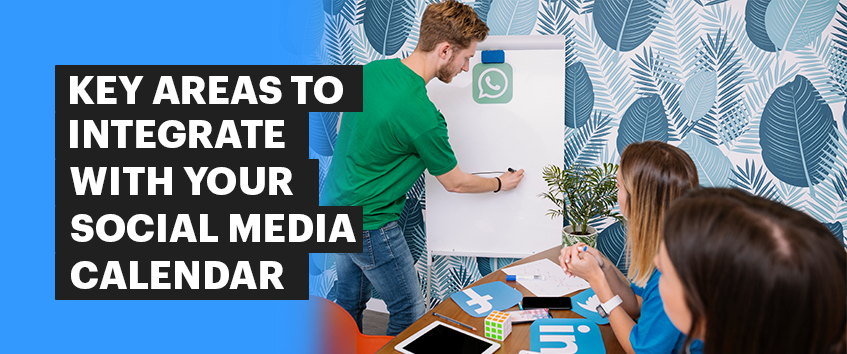
To maximise the effectiveness of your social media efforts, it’s crucial to align your social media calendar with key areas of your marketing strategy. By integrating content planning, campaign coordination, audience engagement, and performance metrics, you create a more cohesive and impactful approach.
Content Strategy Integration
Your social media calendar should not function in isolation. Integrating it with your overall content marketing plan ensures a seamless flow of messaging across all channels. This alignment helps streamline your efforts and maintain a consistent brand voice, ensuring that every piece of content supports your broader marketing objectives.
By aligning your social media calendar with your content strategy, you can plan posts around core themes, blog publications, and video releases. For example, if you’re launching a blog series, your social media calendar can feature snippets, quotes, or visual highlights from each article to drive traffic back to your website. This integrated approach also enables efficient content repurposing, where a single case study can be transformed into multiple posts, infographics, or stories, extending its reach and impact.
Campaign Coordination
Coordinating your social media calendar with broader marketing campaigns is key to amplifying your promotions. Whether it’s a seasonal sale, a product launch, or a special event, integrating your social media efforts with other marketing activities creates a unified campaign that resonates across all channels.
For instance, during a product launch, your marketing team might be executing email promotions, updating website banners, and running paid ads. By aligning your social media calendar with these initiatives, you ensure cohesive messaging that reinforces the launch across every touchpoint. Sharing behind-the-scenes content, teaser videos, and countdown posts on social media can generate excitement, while live updates and real-time engagement during the launch help sustain momentum.
Campaign coordination also allows for strategic content timing. By synchronising social media posts with email blasts and other activities, you ensure your audience receives a consistent message, making it easier for them to understand the campaign’s value. This approach not only enhances reach but also creates a more engaging experience for your customers.
Audience Engagement Tactics
A unified approach to social media and customer engagement significantly improves your connection with the audience. Integrating your social media calendar with tools like CRM software and email marketing platforms provides a comprehensive view of audience preferences, behaviours, and interactions. This data informs your social media content, helping you address current questions, concerns, or trending topics.
For example, if your customer service team notices frequent inquiries about a product feature, you can create social media posts offering helpful tips or answers. Similarly, social media content can reinforce messages from email campaigns by showcasing user-generated content or customer testimonials. This alignment ensures that your content is timely and relevant, fostering stronger audience connections.
Performance Metrics Alignment
To evaluate the success of your social media strategy, align your social media goals with broader marketing KPIs. Integrating your social media calendar with analytics tools and performance metrics provides a clear view of your marketing performance, helping you track, report, and optimise your efforts.
For example, if your goal is to increase brand awareness, focus on metrics like reach, impressions, and follower growth. Integrate these metrics with website traffic and lead generation data to assess top-of-funnel engagement. If your objective is to drive conversions, monitor click-through rates and social shares for product-focused posts. This integrated data helps you make informed adjustments to your strategy, ensuring it remains agile and performance-driven.
The Benefits of a Well-Integrated Social Media Calendar
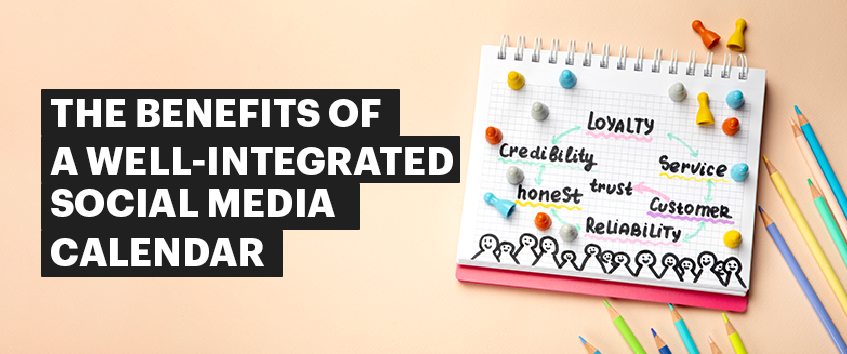
A well-integrated social media calendar is more than just a posting schedule; it serves as a central hub for planning, coordinating, and optimising content across multiple channels. By linking your social media calendar with other marketing tools, you unlock several key benefits:
- Increased Efficiency and Time Management
Integrating your social media calendar with project management tools, content management systems, and email platforms streamlines the content creation process. Teams can coordinate tasks, avoid duplicate efforts, and maintain a clear workflow. This unified system reduces back-and-forth communication, saves time, and ensures timely publication. Additionally, repurposing content for various platforms maximises its value and allows for more strategic planning. - Improved Content Consistency
Consistency is essential for building brand trust. An integrated calendar aligns your social media posts with other marketing efforts, ensuring uniform messaging, tone, and branding. Whether you’re running a promotional campaign or sharing educational content, a cohesive approach reinforces your brand’s identity and keeps your audience engaged. Having a clear overview of planned content helps maintain a balanced mix of posts. - Enhanced Customer Experience
A unified social media calendar creates a seamless experience for your audience. Aligning your social media content with email campaigns and customer support activities ensures consistent messaging and smooth interactions. When customer service teams are aware of ongoing social media campaigns, they can provide relevant responses, reducing friction and enhancing engagement.
- Better Insight and Decision-Making
Integrating your calendar with analytics tools and CRM systems provides valuable performance insights. Access to comprehensive data helps you track engagement, identify trends, and adjust your content strategy in real time. This data-driven approach enables you to make informed decisions, optimise content, and align your social media efforts with business objectives.
Integrating your social media calendar with other tools leads to greater efficiency, consistency, improved customer experiences, and data-backed decisions, driving better results across all channels.
Steps to Effectively Integrate Your Social Media Calendar
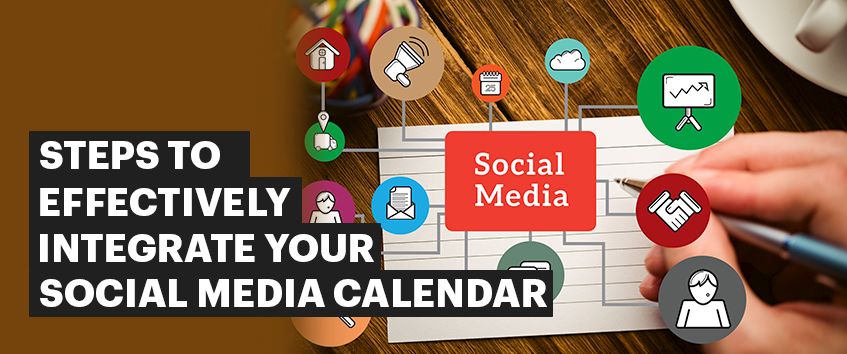
To maximise efficiency, integrate your social media calendar strategically with other marketing tools. Here’s a streamlined approach:
Step 1: Align Marketing Objectives with Social Media Goals
Start by defining clear, measurable marketing objectives (e.g., increasing brand awareness, generating leads). Align your social media activities with these goals to maintain consistency and focus. This alignment ensures every post has a purpose and supports your overall strategy.
Step 2: Create a Cohesive Content Plan
Develop a unified content plan that spans social media, email, and website updates. Identify key themes and synchronise posts across channels. Coordinate your content schedule to reflect upcoming events or product launches, reinforcing messaging and maximising impact.
Step 3: Streamline Content Creation and Scheduling
Establish a structured process for ideation, creation, approval, and scheduling. Use integrated tools for seamless collaboration, reducing delays. Schedule posts in advance using social media management tools to ensure timely publication and adapt based on performance insights.
Step 4: Monitor and Optimise Continuously
Track performance metrics (e.g., engagement, traffic) and analyse data regularly. Adjust your calendar based on what works best, optimising content to align with audience preferences and market trends. Regular reviews help refine your strategy and keep it aligned with business goals.
Common Challenges in Integration and How to Overcome Them
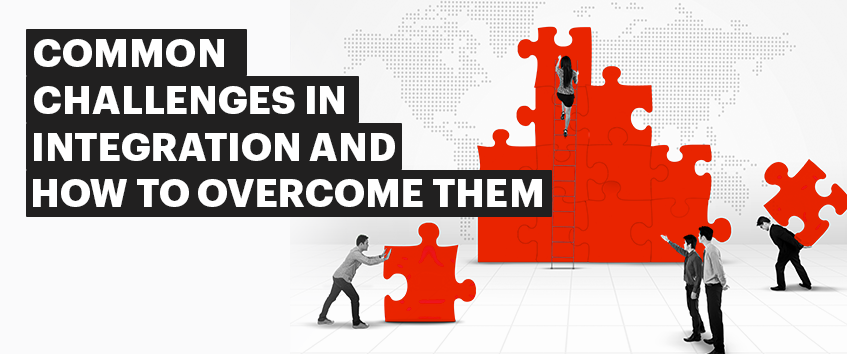
Integrating your social media calendar with other marketing tools can be transformative, but it’s not without its challenges. As businesses attempt to streamline their marketing processes, they often encounter roadblocks that can hinder success. Let’s explore some common challenges in integration and practical ways to overcome them.
Inconsistent Messaging Across Channels
Maintaining a unified brand voice across multiple platforms is one of the most frequent challenges in integration. Each channel—whether it’s social media, email, or your website—has its own nuances and audience expectations. When messaging isn’t aligned, it can create confusion and weaken your brand’s identity.
Lack of Coordination Among Teams
Integration requires cross-functional collaboration, but teams often work in silos, leading to misalignment and missed opportunities. For instance, the social media team might be unaware of an upcoming email campaign, resulting in disconnected messaging and timing issues.
Data Overload and Analysis Paralysis
With integration comes a wealth of data, but this can quickly lead to data overload. Marketing teams may find themselves overwhelmed by the volume of metrics available, making it difficult to focus on what truly matters. This can result in analysis paralysis, where decision-making is delayed due to an excess of information.
Resistance to Change
Introducing new tools and integrated processes can often be met with resistance, particularly from teams that are used to working in a certain way. Adapting to a more integrated approach requires a shift in mindset, which can be challenging, especially for those who are comfortable with established routines.
Best Practices for Successful Integration
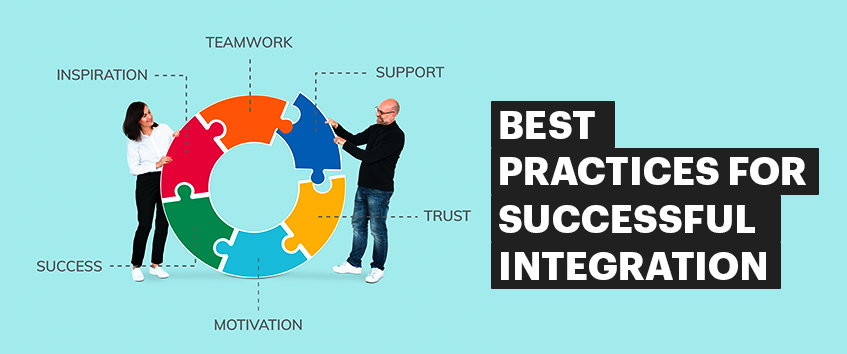
Integrating your social media calendar with other marketing tools can transform your strategy, but it requires careful planning. Here are some key best practices for effective integration:
- Maintain a Consistent Brand Voice
A unified brand voice across all platforms is crucial for building trust. Develop a brand style guide outlining your tone, messaging principles, and visual elements. This guide should be accessible to everyone involved in content creation. Consistency ensures that your audience experiences a cohesive brand message, no matter the channel. - Plan for Seasonal and Special Campaigns
Coordinate your social media calendar with key marketing events, holidays, and promotions. Plan content themes and align messaging across social media, email, and website updates. For instance, a holiday sale should have teaser posts, promotional emails, and consistent website banners. This alignment amplifies your message and enhances campaign impact. - Prioritise Flexibility in Your Strategy
While planning is essential, it’s important to stay adaptable. Monitor real-time performance and be ready to adjust your calendar based on audience response or unexpected trends. Leave room for spontaneous content and pivot your strategy when necessary to stay relevant. - Regularly Review and Update Your Calendar
An effective calendar evolves based on feedback and data insights. Schedule monthly reviews to assess performance, identify trends, and refine your strategy. Use analytics tools to track engagement and conversions, updating your calendar to focus on successful content types and improve messaging.
Following these best practices will help you create a streamlined, cohesive social media strategy that is adaptable, efficient, and aligned with your broader marketing goals.
Maximizing Efficiency Through Integration

Integrating your social media calendar with other marketing tools is a strategic move that can significantly enhance your digital marketing efforts. By aligning your content strategy, coordinating campaigns, and monitoring performance through a unified approach, you create a seamless experience for your audience. This not only ensures consistent messaging across all platforms but also streamlines workflows, making it easier to meet your marketing objectives. For social media marketing companies in Kerala, adopting this integrated approach is key to standing out in a competitive landscape.
An integrated social media strategy allows businesses to be more agile, responsive, and data-driven, helping them achieve their goals faster and more efficiently. With better coordination among teams and a focus on relevant metrics, companies can enhance audience engagement and drive better results across all channels.
Now is the perfect time for businesses to assess their current marketing processes and explore the benefits of integrating their social media calendar. By doing so, they can unlock new opportunities for growth and gain a competitive edge in the market. If you haven’t started yet, take the first step today and experience the difference a well-integrated strategy can make in your overall marketing success.
